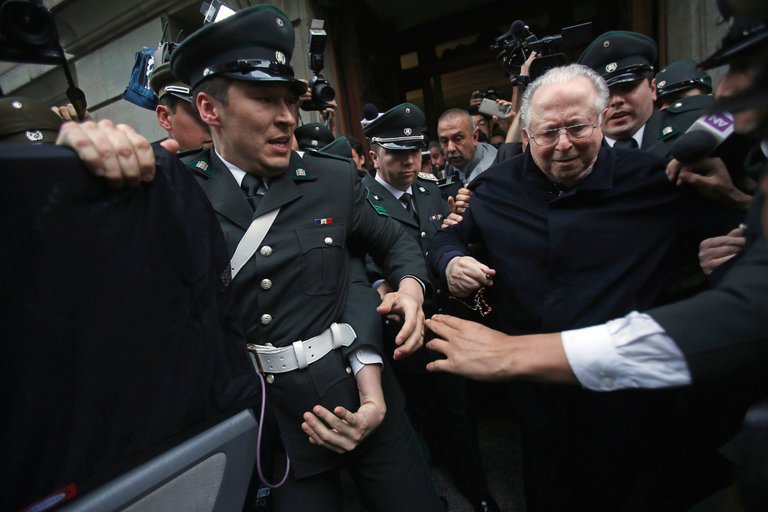Will the Pope Address Sexual Abuse in the Chilean Church?
By Ariel Dorfman
On Monday, Pope Francis begins a four-day visit to Chile. For his trip to be successful, he must confront the scandalous sexual crimes of a vile Chilean priest, Fernando Karadima. Newspapers and television broadcasts in Santiago are filled with reports about Father Karadima’s abuse of minors and his impunity. The allegations against Father Karadima were brought to the attention of the Chilean church in 2004. No inquiry was opened until the victims — after being pressured into silence for years — finally went public. On Thursday morning, a poll on a Santiago radio station claimed that 90 percent of Chileans want the pope to meet the victims, ask for forgiveness and condemn Father Karadima. On Monday, victims abused by priests from several countries are meeting the Chilean victims to denounce the Vatican’s inadequate response to sexual abuse. And there is talk of protests during the papal visit. I was 16 when I first encountered Father Karadima in 1958. He was a spiritual guide to fervently religious friends who attended the wealthy parish of El Bosque, over which he presided, a short bike ride away from my home in Santiago. Though I was an atheist myself, of Jewish origin and left-wing ideas, I was intrigued by the awe in which my buddies held this 27-year-old priest they called saintly, the wisdom and solace they said he offered them, troubled as they were by the doubts and confusion of puberty. So when I received, to my surprise, an invitation to talk with the holy man, I did not hesitate to accept. Continue reading the main story Perhaps my memory of that get-together is colored by what I was to learn decades later about who that priest really was. But as far as I can recall, I was both attracted by his soft magnetism — he treated me as if I were the center of the universe, as if he cared intensely about my well-being and dilemmas — and also disquieted by something in the flash of his cajoling eyes and the sensual enjoyment with which his lips pronounced each syllable. “So here’s the lad who has been disturbing my flock with his subversive ideas,” he said when he greeted me, referring to my heated conversations with my friends about God and sex and revolution. “Let’s see,” he added, not letting go of my hand, “if we can save your soul.” After we met three times to discuss my unorthodox positions, he must have reluctantly concluded that my soul was beyond salvation. And I felt increasingly uncomfortable in his presence, with the delectation with which he conjured up the terrors of hell that awaited a sinner like me if I did not recognize the teachings of the church and Father Karadima’s supervision. It came flooding back when I heard in 2010 that Father Karadima had been accused of assault by three of his young proteges. I could easily imagine the process of seduction, the tentative touching, the invocation of God as an excuse and a secret. The powerful Father Karadima had spiritually groomed thousands of Chileans in the ruling elite, including many who were major sustainers and accomplices of Augusto Pinochet, the dictator who misruled the country from 1973 to 1990. A Vatican investigation in 2011 found Father Karadima guilty of sexual abuse. Investigations by journalists found evidence of financial corruption as well. He had accumulated a fortune for himself and his family by bilking his followers. Father Karadima was not the only Chilean or Latin American priest to be accused of abuse. Yet authorities in the Catholic Church turned a blind eye. Among those suspected of ignoring the assaults by the priests was Juan Barros Madrid, whom Pope Francis named Bishop of Osorno, a city some 500 miles south of Santiago, despite vocal protests from people in the diocese. Father Barros was the disciple and right-hand man of Father Karadima. When Father Karadima was found guilty by a Vatican commission, he was not defrocked but ordered to spend the rest of his life in prayer and penitence. But although the Vatican barred him from celebrating Mass in public, he has been photographed doing so. And he certainly has shown no signs of repentance, even declaring his innocence in court. Chileans of all kinds see the way the pope addresses the Karadima case as a litmus test. Pope Francis will be welcomed in Chile as a reformer, as an important voice for the vulnerable and the neglected. The faithful and the nonbelievers alike respect the Catholic Church because some of its most prominent leaders championed human rights during Pinochet’s dictatorship, defying threats, death squads and persecution. And yet the daring Chilean church is now scarred and discredited by Father Karadima’s depredations, by the fact that he was sheltered by those who should have judged and punished him. A criminal case was opened, as in almost 75 other cases of priestly abuse, but the judges indicated that the statute of limitations barred them from indicting Father Karadima. Pope Francis needs to deal with this lack of accountability and justice in the next few days. He should see this crisis as a great opportunity for him, even as a form of redemption for his silence in Argentina during its years of tyranny and horror, a silence that has reportedly caused him anguish and remorse. By siding with the victims of the church rather than with its conservative and self-serving hierarchy, by publicly condemning Father Karadima by name and denouncing each of those who shielded this malefactor, Pope Francis could, during this visit, help exorcise our ghosts and salve the wounds of Chile. Or does he want to leave the country without having been true to the liberating message of Jesus?
|
.
Any original material on these pages is copyright © BishopAccountability.org 2004. Reproduce freely with attribution.
